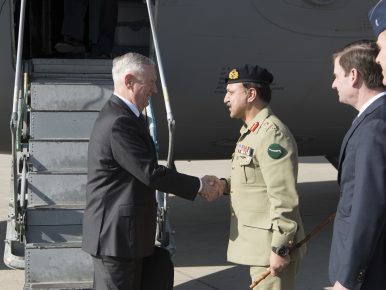By Shannon Tiezzi
 The Trump era in the United States may mark a turning point in the U.S.-Pakistan relationship. Top officials like Secretary of State Rex Tillerson have been upfront about the new U.S. preference for India and frustration with what Washington sees as Pakistan’s continued inaction on terrorism. Meanwhile, Pakistan seems increasingly willing to defy the United States thanks to a newly-deepened partnership with China. These trends were underway during the Obama administration, but seem set to come to a head under Trump.
The Trump era in the United States may mark a turning point in the U.S.-Pakistan relationship. Top officials like Secretary of State Rex Tillerson have been upfront about the new U.S. preference for India and frustration with what Washington sees as Pakistan’s continued inaction on terrorism. Meanwhile, Pakistan seems increasingly willing to defy the United States thanks to a newly-deepened partnership with China. These trends were underway during the Obama administration, but seem set to come to a head under Trump.
For a deeper dive into the state of U.S.-Pakistan and China-Pakistan relations, as well as Pakistan’s domestic situation, The Diplomat spoke with C. Christine Fair, a Provost’s Distinguished Associate Professor in the Peace and Security Studies Program within Georgetown University’s Edmund A. Walsh School of Foreign Service.
The Trump administration’s Afghanistan strategy unveiling in August 2017 didn’t mince words in condemning Pakistan for fostering militant groups on its soil. Do you anticipate this administration will succeed in prompting Pakistan’s military to change its behavior and priorities where previous administrations have failed? What would it need to do to succeed?
Trump will not succeed in prompting Pakistan to change its noxious behavior. In fact, we have already witnessed a serious retrenchment from that “harsh rhetoric.” For example, the Republican-dominated U.S. Congress removed the provision from the National Defense Authorization Act 2018 that previously required the secretary of defense to certify that Pakistan has taken steps to “significantly disrupt” the activities of both the Haqqani network and Lashkar-e-Taiba. The new legislation states that Pakistan must show progress only in managing the Haqqanis. This is an outrageous retrenchment given that LeT continues to operate in India and Afghanistan and that the terrorist group has even fielded a new political party, the Milli Muslim League, with the explicit support of the Pakistan army. If this Republican-led Congress is willing to water down this requirement, what else is it willing to do? Remember, it is the Congress that writes checks — not the White House. I see no reason to believe that Trump’s bluster will yield success where the past two presidents have failed.
And there is a basic reason for this: we still need access to a port to resupply the Afghan National Security Forces. Geography over-determines America’s options. Russia dominates the countries involved in the so-called Northern Distribution route. The Americans were never permitted to move lethal goods through that corridor and at the height of its use, it carried no more than 20 percent of cargo supplying the American- and NATO-led efforts in Afghanistan.
There is another neighbor of Afghanistan that has a port: Iran. Indeed the JCPOA (the so-called nuclear agreement with Iran) opened up the possibility of moving supplies from the port in Chabahar, which was built with Indian assistance. I am sure once Trump bothered grappling with logistics and looking at a map, reality sunk in. The administration cannot both vilify Pakistan and Iran. So the administration has made the same choice as Bush and Obama: keep working with Pakistan even though Pakistan is far more dangerous than Iran is. Whereas Iran is a regional threat, Pakistan is a global threat.
No comments:
Post a Comment